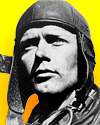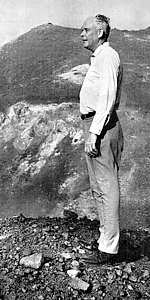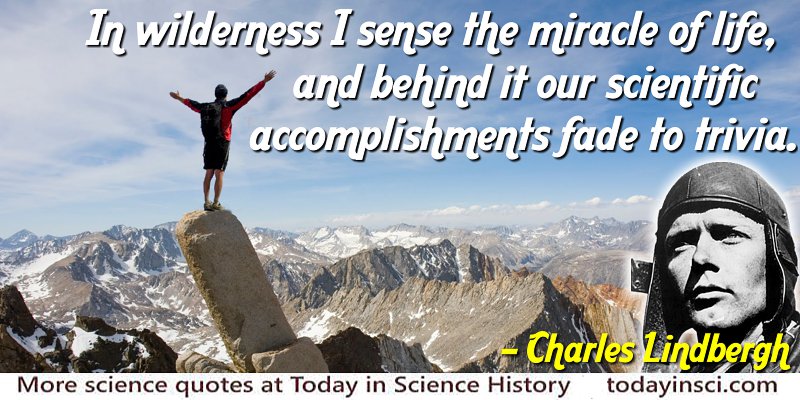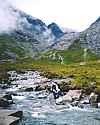Today in Science History - Quickie Quiz
 (source)
(source)
|
Charles A. Lindbergh
(4 Feb 1902 - 26 Aug 1974)
American aviator who is famous for making the first nonstop solo flight across the Atlantic (1927). Lindbergh left New York for Paris, carrying sandwiches and water. He fought fog, icing and drowsiness, and landed in Paris 33½ hours later after his 3,600 mile flight.
|
Charles A. Lindbergh
“In wilderness I sense the miracle of life”
Illustrated Quote - Large (800 x 400 px)
“In wilderness I sense the miracle of life, and behind it our scientific accomplishments fade to trivia.”
— Charles A. Lindbergh
In 'The Wisdom of Wilderness', Life (1967)

Charles Lindbergh, at 65, stands on the volcano Krakatau, Indonesia.
(source)
Forty years after his flight across the Atlantic, at age 65, Charles Lindbergh wrote 'The Wisdom of Wilderness' for Life magazine (22 Dec 1967). It was the lead article for a special double issue in 1967, with the theme 'The Wild World', which was printed on the cover. Lindbergh was still an aviation consultant, but had been devoting much of his time to conservation. As a director of the World Wildlife Fund, he worked to set aside wild land areas all over the world and to protect endangered species, particularly the blue whale.
He opened the article, recalling how his
“interest in wildness roots back to early boyhood and stories my father told me about Minnesota's frontier when he was my age. Woods were full of deer, he said, the sky often black with duck; every lake and river held its fish. Chippewa Indians built their tepees near his home. The frontier was a wonderful place for a boy to grow up. He wished I could have been there with him.”
As a boy, Charles Lindbergh learned to drive at the age of 11, and was flying by age 20. Aviation became his profession, in a world so different—within one generation—from his father’s frontier days. Yes,virgin forest had been cut, and wild duck and fish were scarce. But Lindbergh recognized scientific progress brought compensations with innovations and technology:
“My own lifetime spans the Wright Brothers’ Kitty Hawk flight and manned-satellite orbiting.”
Yet, he yearned for a world less overwhelmed by technology, and he had qualms about its consequences:
“be a reservoir for power. Obviously the scientific progress so alluring to me is destroying qualities of greater worth. … with wilderness outside. Had the choice confronted me, I would not have traded nature's miracles of life for all of science’s toys. Was not my earth's surface more important than increasing the speed of transport and visiting the moon and Mars? If I were entering adulthood now instead of in the environment of 50 years ago, I would choose a career that kept me in contact with nature more than science. … From the dynamics of an atom, nature produces the tranquillity of a flower, the joy of a porpoise, the intellect of man—the miracle of life.
In wildness I sense the miracle of life, and beside it our scientific accomplishments fade to trivia.
The construction of an analogue computer or a supersonic airplane is simple when compared to the mixture of space and evolutionary eons represented by a cell. In primitive rather than in civilized surroundings I grow aware of man’s evolving status, as though I were suddenly released from a hypnotic state. Life itself becomes the standard of all judgment. How could I have overlooked, even momentarily, such an obvious fact?”
Text by Webmaster, with quotations and b/w image from Charles Lindbergh, 'The Wisdom of Wilderness',
Life (22 Dec 1967),
63, No. 25, 8-10.
(source)
Nature bears long with those who wrong her. She is patient under abuse. But when abuse has gone too far, when the time of reckoning finally comes, she is equally slow to be appeased and to turn away her wrath. (1882) --
Nathaniel Egleston, who was writing then about deforestation, but speaks equally well about the danger of climate change today.
 Carl Sagan
Carl Sagan: In science it often happens that scientists say, 'You know that's a really good argument; my position is mistaken,' and then they would actually change their minds and you never hear that old view from them again. They really do it. It doesn't happen as often as it should, because scientists are human and change is sometimes painful. But it happens every day. I cannot recall the last time something like that happened in politics or religion. (1987) ...
(more by Sagan) Albert Einstein: I used to wonder how it comes about that the electron is negative. Negative-positive—these are perfectly symmetric in physics. There is no reason whatever to prefer one to the other. Then why is the electron negative? I thought about this for a long time and at last all I could think was “It won the fight!” ...
(more by Einstein) Richard Feynman: It is the facts that matter, not the proofs. Physics can progress without the proofs, but we can't go on without the facts ... if the facts are right, then the proofs are a matter of playing around with the algebra correctly. ...
(more by Feynman)
 (source)
(source)







